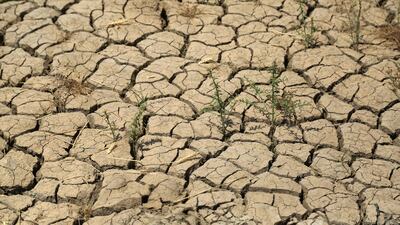Iraq will experience full-blown environmental degradation unless swift action is taken to tackle climate change, government officials and experts said on Monday.
The Ministry of Environment stated that Iraq ranks fifth on the list of countries that are most vulnerable to the effects of global warming, while the country's population of 40 million people is already facing environmental challenges including water scarcity, heatwaves and dust storms.
These challenges “limit the capabilities to fight poverty, to enhance livelihoods and to temper conflicts over natural resources”, Mohammed Al Allaf, dean of the Faculty of Agriculture at Mosul University, told a forum on climate change.
“By now, all have realised that protecting natural resources is essential to protect the environment,” Mr Al Allaf said. “Everyone will lose with any environmental collapse.”
Abandoning outdated agricultural methods and preserving the country’s vegetation cover are among the top priorities, he said.
Trees once covered more than 60 per cent of Iraq's land but Mr Al Allaf said this had dropped to less than 4 per cent.
“This a great catastrophe for us.”
One dunam — 1,000 square metres — of forest can absorb 140 kilograms of carbon dioxide and three to five tonnes of dust each year, he said.
Planting millions of dunams of forest, therefore, is urgently needed to reduce CO2 emissions, increase oxygen levels and cut pollution.
“Vegetation is not only a friend to the environment but also the cornerstone in the efforts to protect it,” Mr Al Allaf said.
Another pressing issue addressed during forum was water scarcity. About 90 per cent of the water feeding Iraq’s two main rivers, the Tigris and Euphrates, originates in Turkey or Iran.
The two countries — both facing their own recent water crises — have built dams and diverted water away from the rivers.
For decades, Iraq has failed to reach agreements with Iran and Turkey on how to ensure a fair division of the water supply, as both countries say that they, too, are suffering from scarcity of water and that Iraq follows outdated irrigation methods.
Other speakers at the forum called for more investment in renewable energy, modern waste-management technology, reducing the number of cars on Iraqi roads, raising awareness through new school curricula and for new laws aimed at stopping damage to the environment.
'We don't have time'
Abdullah Al Khafajy, a doctor and a climate activist, blamed the poor state of Iraq's environment on government inaction and the bad habits of Iraqis.
Dr Al Khafajy chastised the government for the absence of a proper green strategy in the oil sector and said that the country’s waste-management system was outdated, contributing to high air and water pollution.
“In a lot of cases, [government agencies] just burn the trash and this leads to very disastrous health outcomes — especially for the respiratory systems of human beings,” he said.
“Those fumes contain toxic materials — we in Baghdad smell those toxins almost weekly where they are burned.”
High levels of air pollution, he said, was one of the main reasons why rates of cancer and birth defects were rising in the country.
“All the time we try to advocate, we try to make change, [then] we get hit very hard by bureaucracy, corruption and political instability,” he said.
Dr Al Khafajy said the government had to act fast “because we don’t have time, Iraq is becoming a huge desert, we’re getting buried with sandstorms almost weekly and we can’t stand this and tolerate this any longer”.
He called on government and private sector to fund green initiatives, to allow youths to play their role in shifting the economy and to encourage more environment-focused start-ups.
However, he acknowledged that the road to environmental progress will be long.
“We need to educate, we need to advocate for the inclusion of climate action in our curricula not just the university curricula, but also middle school and primary school,” he said.
“We need children to grow up learning about the climate change and the catastrophe that could happen if we do not take action as soon as possible,” he added. “We should all take action to combat that.”
The one-day Climate Change International Forum took place in Mosul, a city that is still recovering from the three-year reign of ISIS and the war to drive the militants out.
Mosul and surrounding areas are facing a wide range of challenges, from postwar reconstruction to threats from climate change.
Despite its woes, Mosul has set an example for other Iraqi cities.
Last year, the non-governmental group Mosul Eye launched a drive to plant trees in and around the city, including a forest inside the city itself. More than 9,000 trees have been planted so far.
Provincial authorities in the province of Nineveh, where Mosul is located, planted more than 21,000 trees of different varieties last year, reviving part of its famous forests damaged during the war against ISIS. More than 3,000 trees have been planted this year alone.
“The current situation in Iraq is critical and we need to act swiftly,” said Anas Al Taie, executive director of Mosul Eye, which organised the forum.
“The problems we are facing in Iraq in general and Mosul in particular need years to be dealt with in order to change the reality.
“More provinces, especially those in southern Iraq, will lose a lot due to searing temperatures, lack of water and lost vegetation.”

















